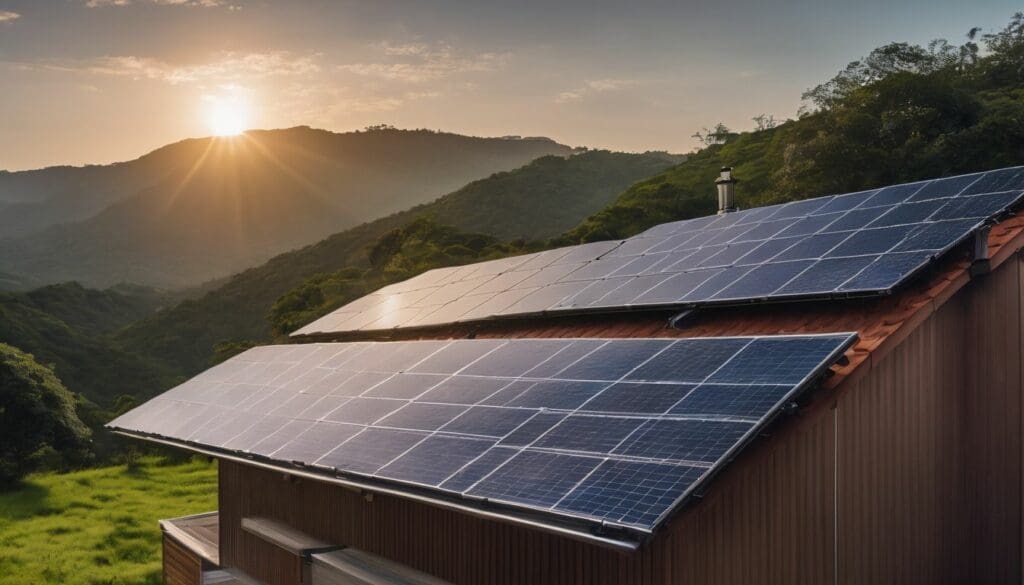Are your electricity bills through the roof each month? Solar panels can slash these costs significantly. This blog post will guide you on how solar investment reduces expenses and aids the environment.
Keep reading; it’s enlightening!
Key Takeaways
- Solar panels reduce electricity bills and provide long-term savings, with the potential to earn credits through net metering.
- Government subsidies and incentives make solar power more affordable, often leading to a decrease in initial installation costs.
- Installing solar panels increases home value due to their desirability for reducing energy expenses and their contribution to environmental conservation.
- Solar energy systems are durable, lasting 25 – 30 years or more, providing a reliable source of clean energy that decreases homeowners’ carbon footprints.
- Accessibility to solar technology has improved significantly, offering homeowners various financing options and increasing affordability over time.
Understanding Solar Power
Solar power for the home harnesses energy from the sun using photovoltaic panels, converting it into electricity. This clean and renewable energy source has significant environmental benefits and can lower your carbon footprint.
What is solar power for the home?
Solar power for the home harnesses energy from the sun to generate clean electricity. Photovoltaic panels, or solar panels, are installed on your roof and convert sunlight into electrical energy.
This process means you can produce your own renewable energy right where you live. It’s a sustainable way to cut down on fossil fuel use and reduce your carbon footprint.
Homes with solar power systems enjoy numerous benefits: they contribute to environmental conservation by lowering emissions and also have greater control over their monthly expenses, particularly electric bills.
Solar energy represents a smart investment in both personal finance and planetary health. As you feed excess electricity back into the grid, in many places, you might even receive credits from utility companies—a practice known as ‘net metering.’ This aids in further slashing those costs associated with traditional electrical sources.
How it works
Solar panels work by converting sunlight into electricity through a process called the photovoltaic effect. When sunlight hits the solar cells within the panels, it creates an electric field that generates direct current (DC) electricity.
An inverter then converts this DC electricity into alternating current (AC), which is the type of electricity used to power homes and businesses. This clean and renewable energy can be used to meet a home’s electrical needs or even feed excess electricity back into the grid.
Through this process, homeowners can reduce their reliance on non-renewable energy sources and lower their carbon footprint. Solar panels also continue to generate power during cloudy days because they rely on daylight, not direct sunlight, making them a reliable source of clean energy year-round.
Investing in home solar panels is an effective way to harness sustainable energy and contribute positively towards environmental preservation while enjoying long-term financial benefits.
Environmental benefits
Transitioning from understanding how solar power works to its environmental benefits, it’s important to consider the positive impact on the environment. By investing in home solar panels, you significantly reduce your carbon footprint and contribute to sustainable living.
Solar energy is a clean and renewable source of power that helps decrease harmful emissions and minimises reliance on non-renewable resources, promoting green technology and energy independence.
Choosing residential solar not only lowers electrical costs but also supports conservation efforts while positively influencing property values. This investment in solar panels aligns with an eco-friendly lifestyle, offering electricity savings and enhancing the environmental impact of your home.
The Cost of Solar Panels
When considering the cost of solar panels, it’s important to calculate the initial investment and potential long-term savings. Subsidies and incentives can help make the transition to solar power more affordable for homeowners.
Calculating costs
Calculating the costs of installing solar panels involves several considerations. First, factor in the initial upfront costs, including the cost of the panels and installation. Next, consider any available subsidies and incentives that can help offset the initial investment. Additionally, calculate long-term cost savings by estimating your potential energy bill reductions over the lifespan of your solar panels. Lastly, factor in any maintenance or repair costs that may arise during the lifetime of your solar panels.
Subsidies and incentives
Subsidies and incentives are available to help offset the initial cost of installing solar panels. Here are some of the benefits you may be eligible for:
- Feed-in Tariffs: You can earn money by selling excess electricity back to the grid, making your investment more profitable.
- Tax Credits: Governments often offer tax credits for installing solar panels, which can significantly reduce your installation costs.
- Rebates: Some areas provide rebates to homeowners who invest in renewable energy, helping to lower the overall expense.
- Net Metering: This allows you to use your surplus solar power when needed and receive credits for any excess energy put back into the grid.
- Grants: Certain regions offer grants for individuals investing in renewable energy, further lowering the financial barrier.
Long-term cost savings
After taking advantage of subsidies and incentives, investing in home solar panels can lead to significant long-term cost savings. Solar energy systems typically have a lifespan of 25-30 years, offering decades of free electricity once the initial installation costs are covered.
By generating your own power, you can significantly reduce or even eliminate your reliance on grid electricity, resulting in lower utility bills and protection against rising energy prices over time.
The long-term financial benefits make home solar panel investment an attractive option for environmentally conscious individuals looking to minimise their carbon footprint while saving money.
Benefits of Investing in Home Solar Panels
Investing in home solar panels can lead to lower utility bills, improved energy security, increased property value, and a positive impact on the environment. To learn more about the benefits of going solar, keep reading!
Lower utility bills
Home solar panels lead to lower utility bills by harnessing the sun’s energy, reducing reliance on traditional electricity sources. This results in substantial long-term cost savings and increased affordability for homeowners.
Solar power systems generate electricity during peak daytime hours, cutting down on the need to purchase electricity from the grid.
Investing in home solar panels can significantly reduce your monthly electric bills, providing a sustainable way to save money while contributing to environmental conservation efforts.
By lowering utility costs, homeowners can allocate their resources to other essential expenses or investments for future financial security.
Improved energy security
Investing in home solar panels improves energy security by reducing dependence on the traditional energy grid. With solar power, homeowners can generate their own electricity, which means they are less vulnerable to blackouts and fluctuations in utility prices.
Solar panels provide a reliable source of energy, ensuring that there is always power available, especially during emergencies or adverse weather conditions.
Solar energy also contributes to a more robust and resilient energy infrastructure at both individual and community levels. By embracing renewable energy sources like solar power, households play a part in diversifying the country’s energy mix, which promotes stability and sustainability for future generations.
Increased property value
Investing in home solar panels can significantly increase the property value. Solar energy benefits are attractive to potential buyers, leading to higher home values and a competitive edge in the real estate market.
The appeal of lower electric bills and lower carbon footprints also contributes to the increased desirability and investment potential of homes with solar panels.
Homeowners who invest in solar energy experience first-hand that their properties become more sought-after due to the long-term cost savings and environmental impact associated with solar energy.
Environmental impact
Switching to solar energy at home significantly reduces your carbon footprint, helping to combat climate change and air pollution. By harnessing the power of the sun, solar panels generate clean electricity without emitting harmful greenhouse gases.
This eco-friendly solution not only benefits your household but also supports a healthier environment for future generations.
Investing in home solar panels sets a positive example for sustainable living and demonstrates a commitment to environmental preservation. Solar energy aids in reducing reliance on fossil fuels while contributing to cleaner air and water resources.
Considerations when Going Solar
Consider the accessibility and affordability of installing solar panels, as well as their potential impact on homeowners insurance and property tax changes. These are important factors to consider before making a decision to invest in home solar panels.
Accessibility and affordability
Solar panels have become increasingly accessible and affordable for homeowners looking to invest in renewable energy. With various financing options available, such as loans, leases, or power purchase agreements, the upfront cost of installing solar panels can be manageable.
Additionally, government subsidies and incentives can significantly reduce the initial investment required for solar panel installation, making it an economically viable option for many households.
As technology continues to advance, the affordability of solar panels is expected to further improve over time.
Moreover, accessibility has grown as more companies offer flexible financing plans tailored to individual needs. Many providers also offer free consultations and assessments to help homeowners determine the suitability and potential cost savings of going solar.
Impact on homeowners insurance
Installing solar panels on your home may have an impact on homeowners insurance. It’s important to notify your insurance provider about the installation, as it could affect your coverage and premiums.
Generally, solar panels are viewed positively by insurers, but it’s essential to clarify any potential changes in coverage or policy terms.
As you consider investing in home solar panels, understanding how they may influence homeowners insurance is crucial. Evaluating these factors can help you make informed decisions regarding your investment in renewable energy sources.
Potential property tax changes
Installing home solar panels can have an impact on property taxes. The addition of solar panels typically increases the value of a property, which can lead to higher property taxes.
However, many areas offer tax incentives or exemptions for properties with renewable energy systems, including solar panels. It’s important to research and understand the potential changes in property taxes before making the investment in home solar panels.
Homeowners who invest in solar energy need to consider the possible implications for their property taxes. While installing solar panels can increase a property’s value, leading to higher tax assessments, there are also potential tax benefits and incentives offered in many areas that offset these concerns.
Frequently Asked Questions
Questions on solar panels and their impact answered by experts in the field. Read more to have all your queries addressed.
Is going solar worth it?
Investing in home solar panels is definitely worth it. Solar energy offers long-term cost savings and significantly lower utility bills, making it a financially sound decision. With subsidies and incentives available, the initial investment becomes more affordable and homeowners can recoup their costs faster.
Additionally, choosing to go solar supports environmental conservation efforts by reducing reliance on fossil fuels and decreasing carbon emissions.
On top of the financial benefits, going solar also provides increased energy security, as homes are less vulnerable to power outages or fluctuations in energy prices. Homeowners also stand to increase their property value with the addition of solar panels, another compelling reason why investing in home solar panels is a worthwhile choice for environmentally conscious individuals supporting conservation efforts.
How long do solar panels last?
When considering the value of investing in solar panels, understanding their lifespan is essential. Solar panels are built to endure various weather conditions and can last for 25-30 years or more with proper maintenance.
As technology advances, modern solar panels could have an even longer life expectancy.
Solar energy investment can assure homeowners of reliable renewable power for decades to come. This longevity makes them a sustainable choice that continues to benefit both the environment and finances over time.
Do solar panels provide a tax benefit?
Installing solar panels can provide a tax benefit as homeowners can take advantage of the federal Investment Tax Credit (ITC). This credit allows homeowners to deduct a percentage of their solar energy system costs from their federal taxes.
The ITC is currently set at 26% and will reduce to 22% in 2023, making it an attractive incentive for those investing in solar power. Additionally, some states offer their own tax credits or rebates, further increasing the financial benefits of going solar.
In conclusion, individuals considering investing in home solar panels should explore the potential tax benefits available at both federal and state levels. These incentives can significantly offset the initial cost of installation and contribute to long-term savings.
Can a house run purely on solar?
A house can run purely on solar energy, especially with the advancement of solar technology. Solar panels capture sunlight and convert it into electricity to power a home’s lighting, appliances, heating, and cooling systems.
By installing sufficient solar panels and using energy-efficient appliances, homeowners can meet their electricity needs entirely from solar power.
The potential for running a house purely on solar depends on factors such as available roof space, local climate conditions, and energy usage patterns. With careful planning and the right equipment, many households can achieve near self-sufficiency in terms of electricity through harnessing the power of the sun.
How many solar panels do I need?
To determine how many solar panels you need, start by calculating your average daily energy usage. Next, consider the efficiency of the solar panels and the amount of sunlight your location receives.
By dividing your total daily energy usage by the output of a single panel, you can estimate the number needed to power your home adequately.
Consider factors such as shading, angle of installation, and available space when deciding on the quantity needed. Consulting with a professional solar installer will ensure accurate calculations tailored to your specific needs and location.
Conclusion
After considering the benefits of investing in home solar panels, it’s clear that they offer significant advantages. Lower utility bills can save money in the long run. Improved energy security ensures a constant power supply.
Increased property value is another perk, and the positive environmental impact cannot be overlooked.
FAQs
1. What are the benefits of investing in home solar panels?
Investing in home solar panels can help reduce your electricity bills, lower your carbon footprint, and increase the value of your property.
2. Can solar energy from my panels provide power for all my home needs?
Yes, with a properly sized installation, solar energy can potentially meet all your household electricity requirements.
3. Are there financial incentives for installing home solar panels?
Many regions offer tax credits, rebates or feed-in tariffs to homeowners who invest in solar panel installations.
4. How do home solar panels impact the environment?
Solar panels produce clean, renewable energy which reduces reliance on fossil fuels and helps cut down greenhouse gas emissions contributing to a healthier planet.





